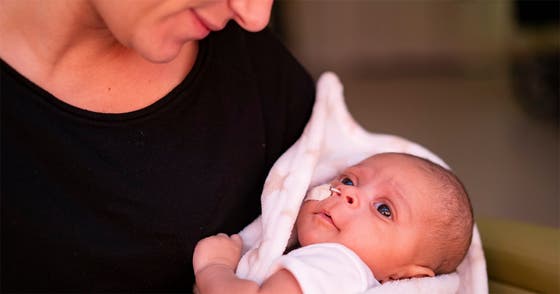Get patients more involved in research on RS virus

The RS virus is one of the main causes of respiratory tract infections in young children. It leads to many hospital and ICU admissions each year. Involving patients in scientific research on the RS virus is of great importance to improve the quality and relevance of the research, argues the RSV Patient Advisory Board in a new scientific publication in The Journal of Infectious Diseases.
RSV is the leading cause of hospitalisation in infants. Estimates from 2015 indicate that approximately 33.1 million lower respiratory tract infections worldwide are associated with RSV. These infections lead to approximately 3.2 million hospital admissions in children under five years of age. In addition, RSV leads to a significant burden of disease in the elderly and adults with impaired immune defences.
At UMC Utrecht, large-scale research into RSV is being carried out. It involves not only doctors, researchers and students, but also patients, who are represented on the RSV Patient Advisory Board (PAB). This is an advisory board made up of parents of children who have had a serious RSV infection. Together with the research group of Louis Bont (UMC Utrecht), they draw attention to the importance of patient participation in scientific research.
Added value
"From the experiences of the RSV research group at UMC Utrecht, we learned what the added value, success factors and barriers are in involving patients in scientific research," says researcher Corline Parmentier, who wrote the article together with Nicole Derksen-Lazet (former chair of the PAB). "First of all, patients and their representatives can point researchers to the research questions that are most important to them. Previous research has shown that this can differ greatly from what scientists consider important. In addition, patient representatives have a unique input into the relevance and feasibility of research, for example, advising on what can or cannot be asked of study participants. They can also inform the public about research results. They do this by combining their scientific knowledge with their personal experiences." Involving patients can also, according to the authors, lead to greater confidence among patients and parents in the research results, which is particularly important with a view to a future vaccine against the RS virus.
The Advisory Board (PAB) was established in 2013 and has since played an increasingly important role in scientific research on RSV. Initially, they were mainly involved locally with the RSV research group in Utrecht. There, they advised on the feasibility of research proposals and helped write grant applications, among other things. In 2016, the work of the PAB was extended to the European level, thanks to the start of RESCEU - a large European research project on RSV. This brought patient participation in RSV research to international attention. In the follow-up project, PROMISE, the Patient Advisory Board will play an important role in surveying and optimising vaccine readiness among parents, given that several candidate vaccines are currently under development.
Barriers
Despite the good experiences with patient involvement in RSV research, increasing patient participation in RSV research is not easy: "There is often a lack of time for both parents and researchers. And although some patients and their families are still affected by RSV for a long time, the transient nature of acute RSV infection makes patient advocates less likely to stay involved in research for an extended period of time," say the authors. "Therefore, it is important that there is flexibility and commitment in the collaboration between researchers and patient representatives."
Structural involvement
The experiences with patient participation in the RSV study in Utrecht show the importance of structural involvement of patients and their representatives. Their involvement can improve the quality and relevance of scientific research. Parmentier: "The time when patients were seen only as study subjects is over. Nevertheless, it is still generally the medical and scientific experts who determine the research agenda. Patients should also be structurally involved in setting the research agenda."
